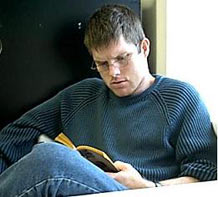 Tuesday, March 22, 2005
Tuesday, March 22, 2005
Chiming in kind of late on the 12-tone argument...I love Boulez
I did not realize that Sequenza21 housed such a large chapter of the Anti-Boulez League.
-The quality or value of a work of art is objective, it is not subject to any (subjective) personal opinion.
I think that too many people are confusing the objective and the subjective. I guess some people dismiss great works of art because of a personal bias.
Disliking something does not change the inherent value of that work of art.
To make statements like, "No one listens to Boulez or buys his cds" is foolish. Also to declare "Boulez is history" is nonsense.
No one can deny the tremendous talent that Boulez possesses. he has created many fine works of art. A personal opinion does not change this.
People are free to dislike Boulez's work, but this does not change the fact that he and many other 12-tone or serial composers have created modern masterpieces.
Perhaps the Chicago audience's reaction to the performances of "Le visage nuptial" and First Piano Sonata was so positive because they realized the performances were of high caliber works.
P.S. Like Steve Hicken, I will also take any twelve tone scores that are no longer wanted.
posted by Everette Minchew
10:07 PM
|
|
 Composer Everette Minchew (born 1977) is consistently active in the creation, performance, and promotion of contemporary music. Moderately prolific, his catalogue includes small chamber pieces for violin, piano, various wind instruments, harpsichord and electronic music. Current commissions include a string trio and an opera based on an 11th-century crusades tale.
His earliest musical training came at the age of eleven when he began playing alto saxophone; it wasn’t long until he began his first attempts in composition.
Composer Everette Minchew (born 1977) is consistently active in the creation, performance, and promotion of contemporary music. Moderately prolific, his catalogue includes small chamber pieces for violin, piano, various wind instruments, harpsichord and electronic music. Current commissions include a string trio and an opera based on an 11th-century crusades tale.
His earliest musical training came at the age of eleven when he began playing alto saxophone; it wasn’t long until he began his first attempts in composition.
He received a Bachelor’s Degree in Music History from the University of Southern Mississippi, where he studied saxophone under world-renowned soloist, Lawrence Gwozdz.
Fearing that traditional university training would hinder his development as a progressive composer, he abandoned the idea of formal lessons in favor of an intense private study of modern masterworks.
Minchew's works are characterized by their intense timbral explorations and brutal dissonance. That is not to say, however, that the compositions are devoid of beauty. In the first of the Two Brief Pieces, for example, the harpsichord chimes stringent yet haunting chords evoking a sense of loss.
Other pieces, like the Figment No. 2 "Juggler's Fancy" play upon the kaleidoscopic interaction between timbres and tones. The rapid alternation of pizzicato, arco bowing, and extreme glissandi remind the listener of Xenakis coupled with a Berio Sequenza. Minchew's Invention "Two-Part Contraption" for piano owes much to Ligeti's etudes and boogie-woogie jazz.
His music has been performed around the United States, and he was the featured composer at the 2005 Intégrales New Music Festival in Hattiesburg, Mississippi.
He currently resides in Hattiesburg, Mississippi with his wife, Cheryl.
CONTACT INFORMATION
| |



